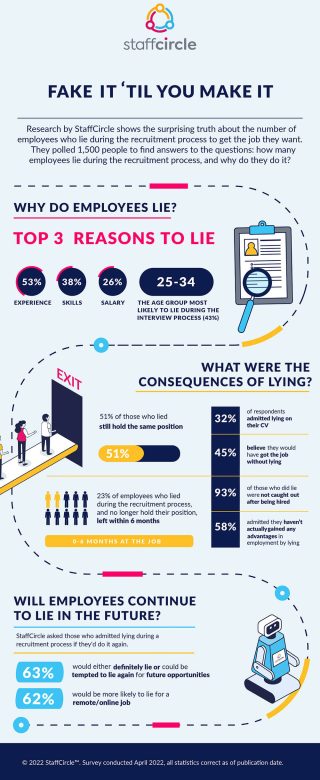According to a new survey, 32% of employees fabricated the truth during the recruitment procedure. The survey, conducted by StaffCircle, polled 1,500 employees and also revealed that out of those who lied, 93% were not caught after getting hired. However, 63% are tempted to lie in the future to get better opportunities, even if they don’t do it.
So what are the most common lies that people tell on their CVs? And what are the consequences if you’re caught? Let’s dissect this key information.
A couple of key reasons why people lied on their CV
In today’s fast-paced environment, people try to look for anything that might give them an edge to get a job. Therefore, people can lie about different things, showing the various types of pressures they face in the market when looking for a job.
A Lack of Experience
A lack of experience is one of the most significant issues fresh graduates face when looking for a job. Most places offering a job prefer an experienced worker over a fresh and inexperienced one, with many explicitly asking for experience. So to increase the chances of landing a job, over 50% of employees felt it was necessary to lie on their CV to cover for their lack of experience.
Career Change
It happens to many people that they go into a field on the recommendation of others, expecting to have a good payoff in the end. However, this can be an extremely daunting thing to do, especially if the person who wants to change careers has no experience or industry knowledge of the field that they are about to enter.
According to the survey, over 18% of the respondents lied on their CVs when trying to make a career change. The reasons why people might feel compelled to lie in wanting to make a career change could be for personal reasons, like wanting to maintain a better work-life balance or job flexibility.
How Can Employers Prevent It?
The survey emphasizes the various issues that companies and honest applicants face. Many businesses are still not very good at detecting lies. The recruitment process is not always perfect, and selecting a candidate who has lied in their CV may cause the wrong person to receive the position.
But thanks to modern technology, employers can use plenty of tools to stop this from happening. For instance, someone can screen incoming applicants and current staff appropriately using good employee performance management software. It can spot possible skills and experience gaps and match suitable people with the correct position inside an organization.
Companies must also do thorough background checks on candidates during the hiring process. At every stage of the hiring process, the HR department should use various vetting processes for the candidates to select the best person for the job. Additionally, reference checks ensure that applicants are not lying about their prior employment history and previous salaries.
Why Lying in Your CV Is Not a Good Idea?
The impulse to lie is there, but is lying in your CV a good idea? Most of the liars among the respondents claimed they were not discovered after lying. However, if found lying, it can have severe consequences. Legal action was taken against 14 of the 1,500 employees who admitted to lying in the hiring process.
Furthermore, although people did openly admit to lying on their CVs, 58% of the surveyed people said that they had gained no real advantage over others because of their lies.
Final Thoughts
The Staffcircle survey addresses the problems that businesses and candidates encounter. Employees must constantly improve their skills, carefully consider the career path they want to take, and refrain from lying on their CVs because it will be harmful in the long term.
Since most vetting systems fall short, businesses should invest in the best performance management software to ensure they can identify lying candidates and hire the best employees.





